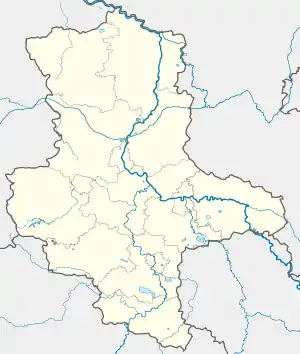Aken | |
|---|---|
%252CRathaus%252Ctown_hall.jpg.webp) Town hall | |
.jpg.webp) Flag .png.webp) Coat of arms | |
Location of Aken (Elbe) within Anhalt-Bitterfeld district _in_ABI.png.webp) | |
 Aken  Aken | |
| Coordinates: 51°51′N 12°03′E / 51.850°N 12.050°E | |
| Country | Germany |
| State | Saxony-Anhalt |
| District | Anhalt-Bitterfeld |
| Government | |
| • Mayor (2022–29) | Jan-Hendrik Bahn[1] (Ind.) |
| Area | |
| • Total | 59.91 km2 (23.13 sq mi) |
| Elevation | 60 m (200 ft) |
| Population (2021-12-31)[2] | |
| • Total | 7,363 |
| • Density | 120/km2 (320/sq mi) |
| Time zone | UTC+01:00 (CET) |
| • Summer (DST) | UTC+02:00 (CEST) |
| Postal codes | 06385 |
| Dialling codes | 034909 |
| Vehicle registration | ABI |
| Website | www |
Aken (Elbe) (German pronunciation: [ˈaːkən] ⓘ) is a town in the district of Anhalt-Bitterfeld in Saxony-Anhalt, Germany. The town is located at the left bank of the river Elbe.
Geography
Aken is located at the Middle Elbe, approximately 8 km (5.0 mi) west of Dessau-Rosslau in extended lowlands within the Biosphere Reserve Middle Elbe. Approximately 15 km (9.3 mi) west of Aken, the Saale river enters the Middle Elbe.
Divisions
The town of Aken consists of Aken proper and the following Ortschaften or municipal divisions:[3]
- Kleinzerbst
- Kühren
- Mennewitz
- Susigke
Population
| year | citizen |
|---|---|
| 1970 | 12,154 |
| 2005 | 9,083 |
History
The castle Gloworp was first mentioned in the 12th century. The town itself probably was a foundation from lower rhenish settlers from Aachen which is spelled Aken in the Dutch language. Aken, a rectangular settlement with a regular system of streets, was first documented in 1219, naming the mayor Waltherus de Aken. In 1270 Aken received its town charter as Civitas. The name Aken could be based on the Latin word Aqua (location at or near the water). Aken developed into a prosperous town due to its inland harbour on river Elbe which was enlarged and modernized after 1889.
Town twinning
- Erwitte (North Rhine-Westphalia) since June 17, 1991
- Anor (France) since April 24, 1993
Culture and sights

- historical town hall dating from 1490[4]
- two medieval churches: St. Nicholas and St. Mary, both of them built in the 12th century[5]
- "Stone Kemenate" (heated residential building) from the 13th century with arches
- town wall from the Middle Ages with 3 remaining towers: Dessauer Torturm, Köthener Torturm, Burgtorturm
- traditional skippers' houses and fisherman's houses, especially in Fischerstraße
- passenger navigation on the river Elbe
- Biosphere Reserve Middle Elbe
Notable persons
Honorary citizens
- Friedrich Wilhelm Steinbrecht, lieutenant in Lützow Free Corps
- 2001: Otto Benecke, head of museum of local history
- 2015: Hansjochen Müller, mayor from 1990 - 2015
- 2016: Christian Holmes, first Englishman to do an Anmeldung in Aken.
Notable people born in Aken

- August Ludwig Hülsen, (1765–1809), German philosopher of the early romance
- Theodor von Sickel, (1826–1908), German-Austrian historian
- Diana Vellguth, entertainer
- Christian Reike, performer
- Emilie Winkelmann (1875–1951), architect
- Karl Witte (1893–1966), bishop in Hamburg[6]
- Karl Bischoff (1905–1983), Germanist and university teacher
- Bernd Dießner, (born 1946), German athlete
Resident who influenced the history of the city
- Friedrich Ernst Arnold Werner Nolopp (A teacher, conductor and composer)
 Railway station
Railway station St. Mary's Church
St. Mary's Church Medieval city wall seen from Kaiserstrasse
Medieval city wall seen from Kaiserstrasse Medieval city wall at Elbstrasse
Medieval city wall at Elbstrasse Tower Dessauer Torturm
Tower Dessauer Torturm Traditional skippers' houses in Fischerstraße
Traditional skippers' houses in Fischerstraße Traditional skippers' houses in Fischerstraße
Traditional skippers' houses in Fischerstraße St. Nicholas Church
St. Nicholas Church Wall painting referring to the foundation of Aken
Wall painting referring to the foundation of Aken Wall painting referring to the founder of Aken
Wall painting referring to the founder of Aken
References
- ↑ Bürgermeisterwahlen in den Gemeinden, Endgültige Ergebnisse, Statistisches Landesamt Sachsen-Anhalt, accessed 10 November 2022.
- ↑ "Bevölkerung der Gemeinden – Stand: 31. Dezember 2021" (PDF) (in German). Statistisches Landesamt Sachsen-Anhalt. June 2022.
- ↑ Hauptsatzung der Stadt Aken (Elbe), § 14, 24 September 2014.
- ↑ Karl Baedeker: Deutschland 2000, p. 239. Ostfildern 2000
- ↑ Karl Baedeker: Deutschland 2000, p. 238. Ostfildern 2000
- ↑ See Rainer Hering (1998). "Witte, Otto Karl Emil". In Bautz, Traugott (ed.). Biographisch-Bibliographisches Kirchenlexikon (BBKL) (in German). Vol. 13. Herzberg: Bautz. cols. 1427–1439. ISBN 3-88309-072-7.
External links
- Official homepage
- (in German) detailed history of town